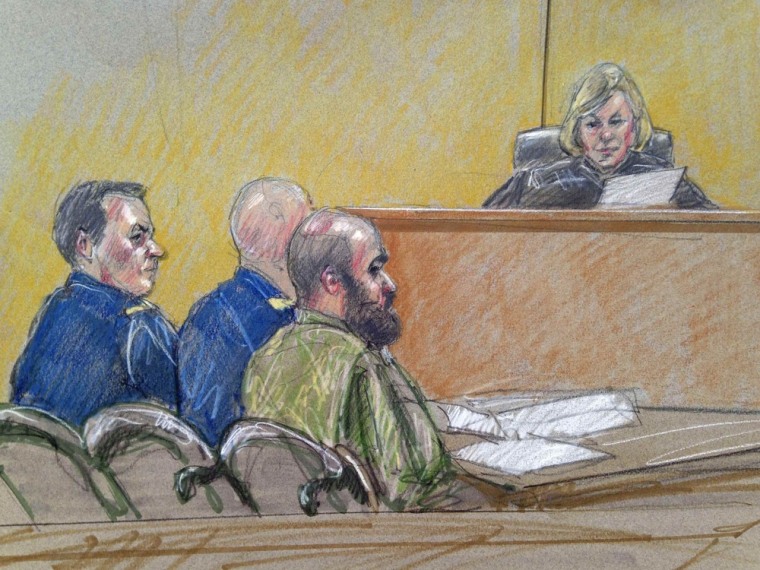FORT HOOD, Texas — Prosecutors on Tuesday questioned 20 Army officers as potential jurors in the murder trial of Maj. Nidal Hasan, an Army psychiatrist accused of killing 13 soldiers in a shooting rampage at Fort Hood in 2009.
Hasan, 42, an American-born Muslim who faces the death penalty if convicted by a military panel for the largest non-combat massacre on a U.S. military base, is mounting his own defense at his court-martial at Fort Hood, an Army base near Killeen, Texas.
The case has been delayed by unusual turns including arguments over whether Hasan could keep his beard, the firing or attempted firing of two legal teams, and the removal of a military judge.
Twenty officers who could serve on the panel were called into the courtroom at the heavily fortified courthouse and asked general questions by the military judge, Col. Tara Osborn, and prosecutors. Hasan asked no questions Tuesday.
The officers were asked whether they could render an impartial verdict and if they objected to the death penalty for religious reasons, among other things. Osborn read hundreds of names of witnesses to the shooting, asking the officers to raise their hands if they knew any of them.
Six potential panel members were excused for cause, and the other 14 will be asked more specific questions when the process resumes Wednesday. The panel will consist of 13 to 16 officers, all of superior rank to Hasan.
Hasan said he opened fire at the base on Nov. 5, 2009, to protect Muslims and the Taliban in Afghanistan from U.S. aggression. He was shot and paralyzed from the chest down in the attack. He faces 13 charges of premeditated murder and 32 charges of attempted premeditated murder.
Osborn told the prospective jurors a command decision was made to allow Hasan to wear the beard for religious reasons, and he was wearing the combat camouflage uniform, rather than a dress uniform normally required for court, for medical reasons.
A panel of at least 12 Army officers must be unanimous when reaching a decision on guilt or innocence. A sentence of death also would require unanimous agreement of the panel.
At a hearing earlier Tuesday before jury selection began, Hasan told Osborn he had rejected former U.S. Attorney General Ramsey Clark's offer to represent him.
Clark, 85, who was attorney general under President Lyndon Johnson, has represented or advised a number of controversial figures, including former Libyan leader Moammar Gadhafi and former Iraqi ruler Saddam Hussein.
Hasan also asked Osborn for permission not to wear his uniform in court. She has not ruled on that request.
"Hasan seems to want to turn this into a kind of show trial where he doesn't deny committing the crime but argues it was justified," said Aitan Goelman, a government prosecutor in the trial of Timothy McVeigh, the Oklahoma City bomber.
He has told the court he spends hours reading the Quran in his cell every day. Witnesses say he shouted in Arabic "God is greatest" while firing the gun in 2009.
If he gets the death penalty, Hasan would go to the military version of death row, at Fort Leavenworth, Kan. The last court-martial execution in the United States was in 1961. Hasan could also be sentenced to life without parole or be found guilty on lesser charges.
